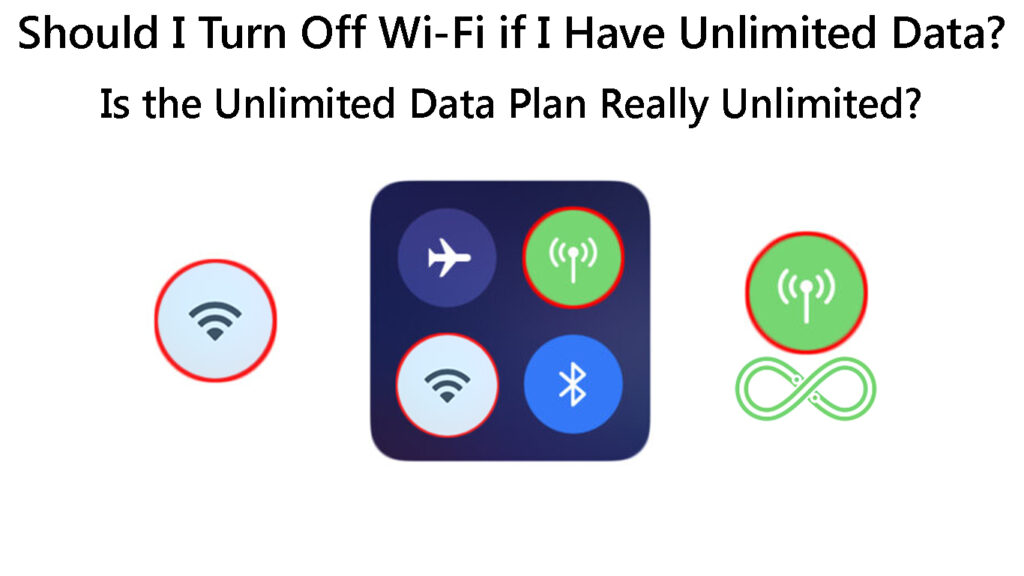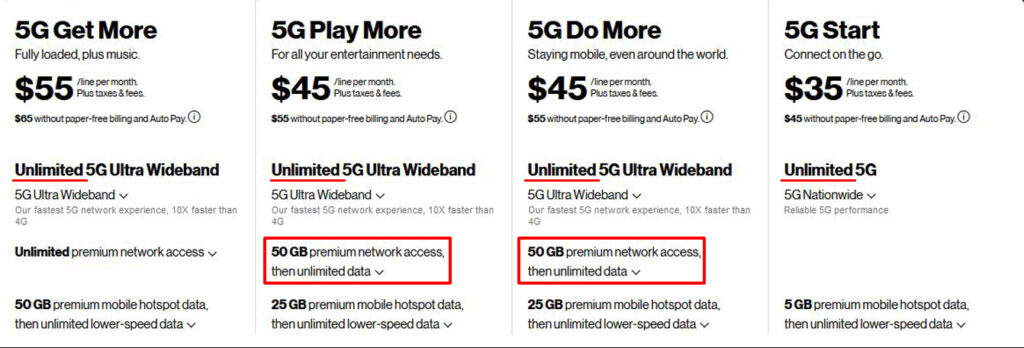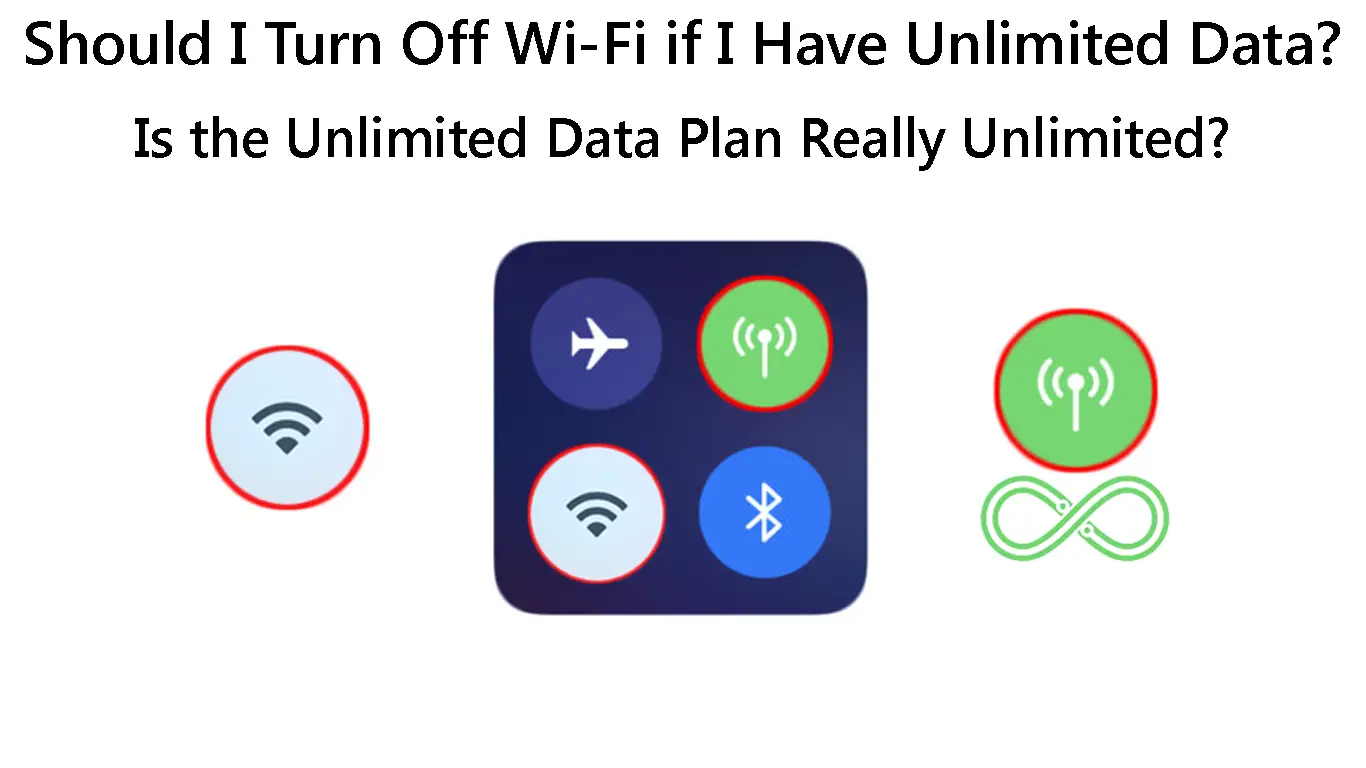If you have a limited data plan, there might be no need to turn off your Wi-Fi connection. However, if you are on an unlimited data plan, there is no need to keep your Wi-Fi connection on all the time.
The main reason to turn off your Wi-Fi connection is to save battery life. When your phone is constantly searching for a Wi-Fi signal, it uses up a lot of battery power.
Nonetheless, it’s important to note that the unlimited data plans offered by many telecommunication companies give users the notion that they can do whatever they want on the internet without any restrictions. With unlimited data, users assume that they can browse high-data content websites, download large files and do anything else that uses more data.
This is not always the case. Unless the internet is entirely wireless, and we are able to communicate via a revolutionary new wireless communication technology, a limitless data plan is impossible.
These days, the idea of an unlimited data connection simply implies that you won’t be charged extra for going over a data limit immediately.

CONTENTS
Is the Unlimited Data Plan Really Unlimited
“Unlimited” is a term that gets thrown around a lot in the cellphone world. Everyone wants a data plan without any limits or caps. That’s why carriers like to use the phrase, but “unlimited” seldom means exactly unlimited.
Unlimited data plans used to be truly unlimited back in the days before smartphones. Back then, people didn’t use as much data as they do now because there wasn’t that much to do with a phone. You could make calls, send texts, and maybe browse the web a bit.
Unlimited Data Plans Are NOT Unlimited
You paid a set amount every month and were free to use as much data as you like. Plans like these have become unpopular as cell phones with internet capabilities, aka smartphones, have gained traction globally.
The problem is that people were using way more data than the carriers anticipated, and the carriers couldn’t keep up with the demand.
Currently, some carriers still claim to offer unlimited data plans, but of course, with a catch.

Here are the common catches that you’ll see with unlimited data plans:
Speed Throttling
Although “unlimited” data plans appear to be advantageous, they often have limits on how much high-speed data you can use. For example, most unlimited plans only grant access to 25GB of high-speed data.
After you use up this much data in a month, your internet speeds will be slowed for the rest of the billing cycle. This can make webpages take longer to load, or you might have issues streaming video.
In practicality, the only thing that’s truly “unlimited” is how much data you’re allowed to utilize. Your carrier doesn’t state anything about limits on data speeds. Of course, you’re welcome to use more than 10GB of data, but your connection will greatly slow down after surpassing the 25GB cap.
Reduced Video Quality
A common way that “unlimited” plans actually limit your data is by capping the quality of video streaming. For example, it might not be possible for you to watch YouTube or Netflix at their best possible quality if you have an unlimited data plan.
It makes sense from the carrier’s standpoint. Streaming video in HD or UHD resolution consumes a lot more data. They may keep you on “unlimited” data while still restricting how much data you consume by limiting the quality of service.
Watch the video below about the limits of an unlimited data plan
Limits of Unlimited Data Plans
Can Unlimited Data Plan Substitute Wi-Fi?
An unlimited data plan can be a great asset, but it’s not a cure-all for high data usage.
Even if you have an unlimited data plan, you may still want to connect to Wi-Fi whenever possible. That’s because Wi-Fi is typically faster and more reliable than a cellular connection.
Recommended reading:
- How to Access a Computer Connected to My Wi-Fi? (Step-by-Step Guide)
- How to Connect Cox Homelife to Wi-Fi Cox Homelife Self-Install Guide (+ Troubleshooting Tips)
- Why Are Wi-Fi Networks So Popular? (What Makes Wi-Fi So Omnipresent?)
Due to the restrictions set by most unlimited data plans, you may find that you need Wi-Fi to stream video or download large files.
Also, an unlimited data plan may not be sufficient to use for your home appliance that needs to connect to the internet, such as home security cameras, printers, fridges, etc. You may want to connect these devices to a Wi-Fi network to avoid using up all your data.
Advantages of Wi-Fi connection over Unlimited Data Connection
Here are some advantages of Wi-Fi connection over cellular unlimited data connection:
No Data Limit (or Much Higher Data Limits)
You can use as much data as you want without worrying about exceeding your limit. Some ISPs may have data caps, but they are usually set at 1.25TB or higher. Most US families won’t have to think about reaching those limits, and won’t have to worry about overage fees.
Higher Quality
Wi-Fi connections typically provide higher speeds and better reliability than cellular data. This means you can stream videos and download files more easily. Wi-Fi can also provide a constant connection quality, whereas cellular data speeds can vary depending on your location.
Save Money
An unlimited data plan can be expensive. If you only use a small amount of data each month, you may be able to save money by switching to a cheaper cell phone plan. If the speed of your unlimited plan is capped, you may be forced to purchase another plan to get the speeds you need.
Connects More Devices
A Wi-Fi network can connect more devices than a cellular connection without interfering with the network’s strength. If you have multiple devices that need a strong internet connection, Wi-Fi might be a better option.
Frequently Asked Questions
Question: Do I need to use Wi-Fi if I have unlimited data?
Answer: No, you don’t need to use Wi-Fi if you have unlimited data. However, you may want to connect to Wi-Fi whenever possible to take advantage of its higher speeds and reliability.
Question: Should I use mobile data or Wi-Fi?
Answer: In general, if you can, use Wi-Fi on your phone instead of cellular data unless you’re performing financial transactions and there’s a risk of hacking. If you see the Wi-Fi symbol on your phone, it means you’re connected to a Wi-Fi network and don’t need to worry about your data usage.
Question: Why should you turn off Wi-Fi at night?
Answer: You may reduce the overall quantity of daily EMF radiation you receive by turning off your house’s Wi-Fi at night. This will improve how you feel and reduce the chances of sleepless nights, fatigue, dizziness, and headaches.
Question: Which is safer, Wi-Fi or mobile data?
Answer: It’s considerably safer to connect through a cell network than it is to utilize Wi-Fi. Why? Well, because data transmitted over the internet isn’t encrypted and most Wi-Fi hotspots aren’t secure. When you use a secured Wi-Fi connection, you can encrypt your data, but it’s still less dependable and automated than a cellular signal.
Question: Should I leave Wi-Fi and mobile data on all the time?
Answer: If you leave your mobile data on, it will run through your battery faster than if it was turned off. There are a few reasons for this. To start with, your phone is always searching for service. If you’re in an area with a patchy signal or no service at all, things only get worse as your phone uses more power to find a signal.
Conclusion
In conclusion, an unlimited data plan is not a bad investment, but it’s important to understand the limits of these plans. If you need a truly unlimited data connection, Wi-Fi is still the best option. However, an unlimited data plan can give you some peace of mind, and it’s probably a better option than a limited data plan. Also, an unlimited data plan may come in handy when you are not within the range of a Wi-Fi network.

Hey, I’m Jeremy Clifford. I hold a bachelor’s degree in information systems, and I’m a certified network specialist. I worked for several internet providers in LA, San Francisco, Sacramento, and Seattle over the past 21 years.
I worked as a customer service operator, field technician, network engineer, and network specialist. During my career in networking, I’ve come across numerous modems, gateways, routers, and other networking hardware. I’ve installed network equipment, fixed it, designed and administrated networks, etc.
Networking is my passion, and I’m eager to share everything I know with you. On this website, you can read my modem and router reviews, as well as various how-to guides designed to help you solve your network problems. I want to liberate you from the fear that most users feel when they have to deal with modem and router settings.
My favorite free-time activities are gaming, movie-watching, and cooking. I also enjoy fishing, although I’m not good at it. What I’m good at is annoying David when we are fishing together. Apparently, you’re not supposed to talk or laugh while fishing – it scares the fishes.

